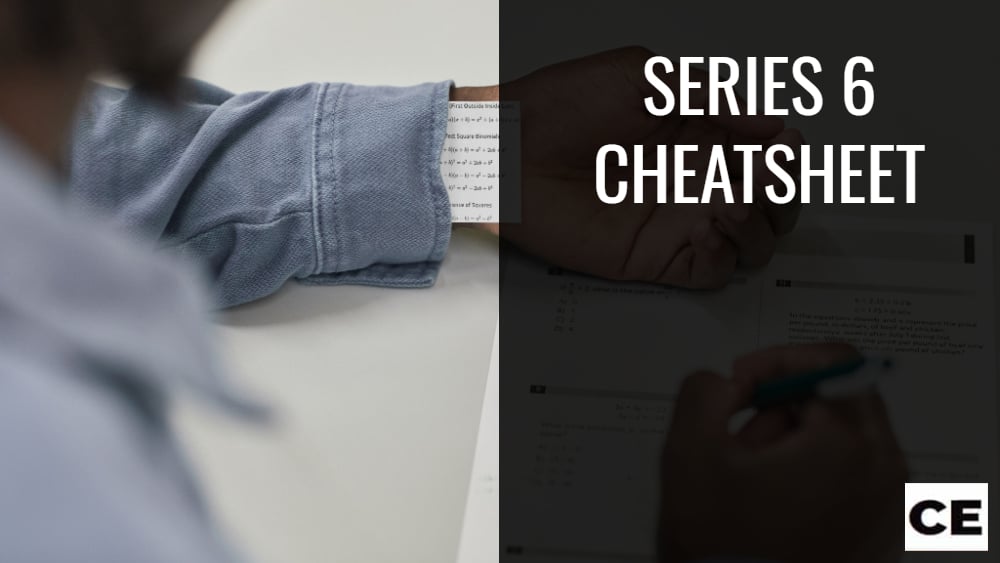Series 6 Study Guide Navigation
- Series 6 Study Guide Home
- 1.1 Reaching out to current and potential customers
- 1.2 Describing products/services and the market to customers
- 2.1 Provides information about the different account types
- 2.2 Secures customer information/documentation and looks out for suspicious activity
- 2.3 Tries to secure investment profile information regarding the customer
- 2.4 Opening accounts and the supervisory approval necessary to do so
- 3.1 Give customers details regarding strategies for investment
- 3.2 Studies and scrutinizes the investment profiles of customers to understand suitability standards and make recommendations
- 3.3 Highlights various disclosures to customers about investment products
- 3.4 Keeps customer records, provides them with information about their accounts
- 4.1 Gives current quotes
- 4.2 Confirmation for customer transactions in line with all regulatory requirements
- 4.3 Informs the appropriate supervisor and assists in resolutions
In this section, we focus on the process of opening accounts for customers, specifically what approvals various accounts need to complete this task.
At all times, FINRA Rule 2111 or the suitability rule, as it is known, must always be at the forefront of a registered representative’s mind when dealing with any customers and especially new ones.
That starts with ensuring that any transaction that they put to a customer is always going to be in their best interests and is indeed suitable for their level of sophistication.
In order to do this, a registered representative must get as much information about a customer as they can.
The more they know about them, the better their recommendations can be when it comes to the types of securities they should be looking to invest in.
The type of information that they need to find out includes:
- What a customer’s income is
- If they already have an investment portfolio and if so, what securities does it hold
- What are their plans for retirement
- What is their current net worth
- And many other aspects of their unique financial situation as well as some nonfinancial information
There are other factors too that will influence the investment decisions a customer will make.
For example, if they know more about the securities a registered representative is suggesting they invest in, particularly when it comes to the overall risks and reward of these suggestions, they are in a far better place to make an informed decision.
Basic account information that you will need from an investor
To start the process of getting the information you need about a customer, the registered representative must have them first fill in a new account form.
Each new customer will have a separate record created for them by the member firm as per SEC regulations.
In these records, the following information must be recorded:
- The name of the customer
- Their tax identification number (as an example, you can record their social security number here)
- Their residential address
- Birthdate
- Their contact numbers
- Information from their passports, driver’s license, or any form of identification from the government
- Their current employment status
- What they do for a living
- If they are a corporate insider or not (this means they own more than 10% of a company)
- What they earn annually
- Their overall net worth
- What their investment objectives for their account are
If the broker-dealer can obtain any additional information that they think can help them suggest the right kinds of investment products to a customer, then by all means go ahead.
Just note, however, that some customers might not be willing to provide all the information requested.
If it seems as if the financial means to support the account can be provided by the customer based on the information they have divulged, then the member firm can go ahead and open the account.
In this situation, the member firm is protected by regulations as long as they made a suitable effort in getting all the information that they possibly could.
When the member firm feels that the customer has not provided the information they need, they cannot then make recommendations to that customer.
The customer may trade still but it’s only going to be using unsolicited trades.
For the Series 6 exam, you may be asked if the signature of the customer will appear on the new account form.
The answer to that is no.
There is a signature to be found on the form and while it’s a requirement, it will come from the principal, an officer, or a manager of the member firm.
The aim of this signature is to show anyone that looks at the form that according to the procedures, policies, and overall acceptance of accounts, the green light for trading has been given.
Note that as a customer’s unique circumstances change, their account form will need to be updated.
If their situation does not change, their form should still receive an update at least once every three years.
Initially, however, a customer must confirm all the information that appears on their new account form at least 30 days after the account first has been opened.
Starting an account for another member firm’s employee
As per regulations, it’s essential that when an associated person of a member firm opens a personal account outside of the firm, these accounts should be monitored.
In fact, they cannot just go ahead and do this without the member firm they are employed by giving them consent.
This isn’t just verbal consent either, it must be written.
This specifically relates to accounts where securities can be traded and where the associated person of the member firm has a beneficial interest in:
- Other financial institutions
- An executing member
Accounts that an associated person might have a beneficial interest in include those that in the name of:
- The associated person’s spouse
- The associated person’s child or their spouse’s child (from before they were married). They must be dependent on the associated person financially and live in the same house.
- Any accounts the associated person controls of other individuals related to them
- Any accounts the associated person controls of the individuals who they financially support and pay contributions to
When establishing such an account, the associated person must notify the member firm in writing when it comes to the employer member and their association.
Specific obligations are the responsibility of members that open an account.
This includes sending copies of confirmations and statements in duplicate should the employee member request it, but only if they do so in writing.
The ease of getting these confirmations, and statements upon written request should be a consideration should the account be opened at a non-FINRA registered financial institution.
Any doubt that these would be readily available might mean that the member firm won’t provide the consent needed to open the account.









